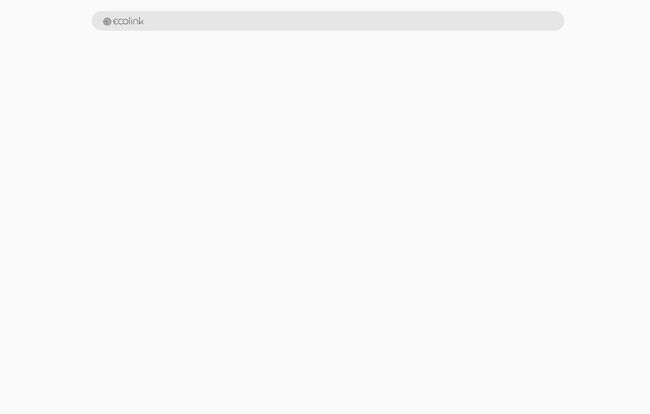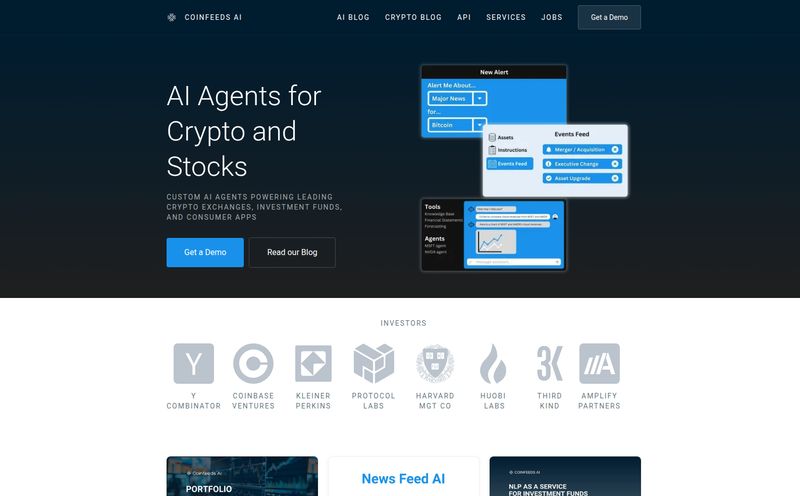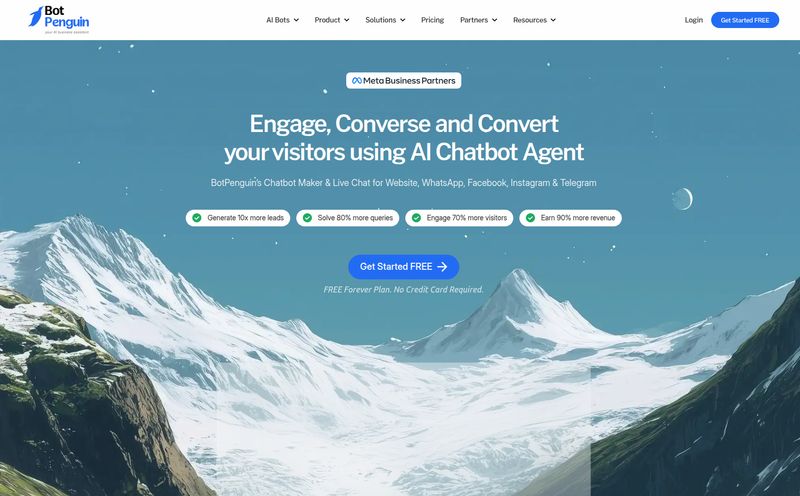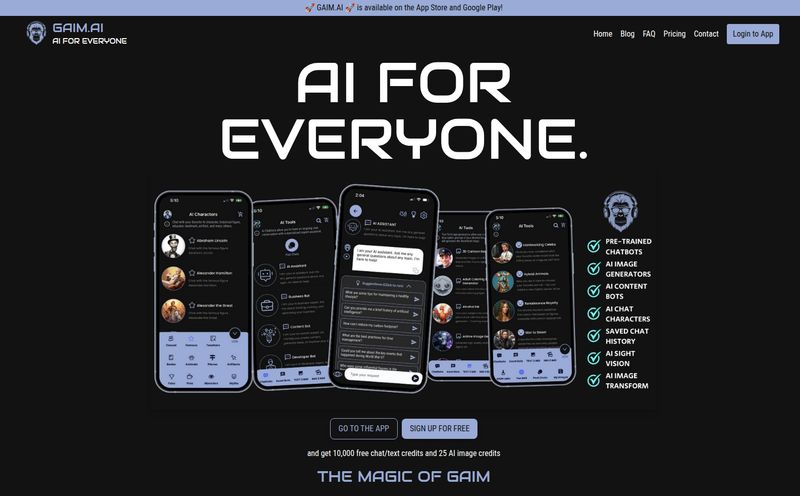For years, we've been swimming in a sea of marketing claims. "Eco-friendly," "sustainably sourced," "all-natural." It’s a lot of noise, right? As someone who’s spent more than a decade watching trends in traffic and consumer behavior, I’ve seen the term “greenwashing” go from a niche complaint to a full-blown consumer crisis. We want to buy better products from better companies, but how can we trust what we're told?
Every so often, a tool pops up that promises to be the answer. The silver bullet. This time, the name buzzing in a few circles is Ecolink AI. The pitch is compelling: a decentralized network using AI to verify sustainability claims, creating clear labels for products, and even rewarding you for making good choices. It sounds like the holy grail for the modern, conscious shopper and a massive opportunity for genuinely sustainable brands.
So, naturally, I had to check it out. And that’s where our story gets… interesting.

Visit Ecolink AI
So, What is Ecolink AI Supposed to Be?
Before I get to my little adventure on their website, let's break down the concept, because the idea itself is fantastic. At its core, Ecolink AI aims to be a bridge of trust between merchants and consumers. Think of it like a Carfax report, but for your coffee beans or your new t-shirt.
It’s designed as a decentralized commerce network. Now, don't let the word "decentralized" scare you off. In this context, it just means that the trust isn't held by one single, fallible company. The verification and data are meant to be spread across a network, making it theoretically harder to manipulate. The goal is to create a system where a brand can’t just slap a green leaf on their packaging and call it a day. They have to back it up with verifiable data. Consumers, in turn, can scan a label and see a real, data-backed story, not just marketing fluff.
The Core Features: How it Aims to Work
From what I've gathered, the platform rests on a few key pillars. If it all works as advertised, it could be a pretty slick system.
Creating Your Sustainability Story with Digital Labels
The most visible part of Ecolink AI would be its sustainability labels. Merchants can input their data—on carbon footprint, water usage, ethical sourcing, you name it—and the platform generates a clear, visually appealing digital label. In a world where we make split-second decisions in a crowded supermarket aisle, a simple, trustworthy visual cue is everything. This could be a game-changer for brands that are truly doing the work but get lost in the noise.
Getting the Green Stamp of Approval
Here’s the absolute crux of the whole thing: merchant verification. For this to be more than just another pretty label, there has to be a robust system for checking that the data merchants provide is legit. This is where Ecolink AI has to prove its metal. Is it using third-party auditors? Cross-referencing public datasets? AI-powered anomaly detection? The information on the exact process is a bit thin on the ground, and honestly, this is the part that gives me pause. The entire system's integrity hinges on this step being rock-solid.
The ECO AI Token: Getting Paid to Be Good?
To incentivize everyone to participate, Ecolink AI introduces a rewards system built around its own cryptocurrency, the ECO AI Token. Consumers earn tokens for buying from verified brands. It’s a fascinating take on a loyalty program, turning ethical consumption into a tangible, and potentially valuable, reward. Of course, anyone who's been in the digital space for a while knows that token values can be... well, let's call it spicy. The value can fluctuate wildly, so it’s more of an interesting bonus than a guaranteed payday. Still, a cool concept.
The Big Question: Is This the Answer to Greenwashing?
I love the ambition. I really do. The thought of a world where I can confidently choose a product based on its real-world impact is incredibly appealing. But as an SEO and a professional skeptic, I have to look at both sides of the coin.
On one hand, the potential is huge. It gives honest merchants a megaphone to shout about their efforts and directly connects them with the growing legion of shoppers who care. It empowers us, the buyers, to vote with our wallets in a way that’s truly informed. This could genuinely drive market-based change, pushing more companies to adopt sustainable practices because they see a direct financial benefit.
| The Bright Side | The Potential Pitfalls |
|---|---|
| Boosts transparency and consumer trust. | Entirely dependent on accurate merchant data. |
| Rewards consumers for ethical choices. | Crypto token rewards can be volatile. |
| Gives sustainable brands a clear advantage. | The verification process isn't clearly defined. |
| Connects a community of conscious consumers. | Needs widespread adoption to be effective. |
On the other hand, there are hurdles. The biggest one, which I keep coming back to, is the data verification. It’s a classic “garbage in, garbage out” problem. If merchants can submit flawed or misleading data, the whole system collapses. Then there’s the chicken-and-egg issue: you need enough verified merchants to attract consumers, but you need a big consumer base to attract merchants. It’s a tough nut to crack for any new network.
A Look Under the Hood: My Experience and a Big 404
Okay, so here's the kicker. When I rolled up my sleeves to really dig into their platform, see a demo, find a pricing page, or even read their whitepaper... I hit a wall. A digital brick wall, to be precise.
A 404 Page Not Found.
Yep. The main website, the portal to this supposed revolution in commerce, was down. Now, this could mean a few things. They could be in the middle of a major relaunch. They might be operating in stealth mode while they build out the tech. Or, less optimistically, they could be facing technical troubles. Whatever the reason, it's not a great look. It’s hard to build trust when your front door is locked.
What's wild is that the project has some serious backers listed, like Nasdaq, Fortune, and VCs like CRV and Menlo Ventures. That kind of support suggests there's something real being built. It creates a weird paradox: serious money and partners on one side, and a 404 page on the other. It makes me think this is a project in its very, very early stages. A powerful idea that hasn’t quite hatched yet.
What's the Price Tag on Transparency?
Given the state of the website, it’s no surprise that a pricing page was nowhere to be found. This isn’t unusual for a B2B platform like this, especially a new one. I’d wager they are pursuing a custom or enterprise-level pricing model for merchants, based on company size, number of products, or the depth of verification required. For us consumers, the platform would presumably be free to use—our participation is the product, after all.
Frequently Asked Questions about Ecolink AI
- What is Ecolink AI in simple terms?
- Ecolink AI is a platform designed to verify the sustainability claims of products. It helps brands create trustworthy labels and rewards consumers with a crypto token for supporting those brands.
- How does the ECO AI Token work?
- It's a reward for consumers. When you purchase a product from a brand verified by the Ecolink AI network, you are supposed to earn ECO AI Tokens. Think of it as a next-gen loyalty point system.
- Is Ecolink AI free for shoppers?
- Presumably, yes. The business model appears to be focused on charging merchants to get their products verified and listed on the network, not on charging the end-user.
- Who is this platform for?
- It's for two main groups: CPG brands and other merchants who want to prove their sustainability efforts, and consumers who want to make genuinely informed, ethical purchasing decisions.
- How does Ecolink AI plan to prevent greenwashing?
- The core idea is its verification process. By requiring merchants to submit data to back up their claims, it aims to create a system where unsubstantiated claims are filtered out. However, the effectiveness of this is still unproven.
- Why can't I access their website?
- As of this writing, their site returns a 404 error. This could be due to a number of reasons, from a temporary technical issue to the company being in a pre-launch or 'stealth' phase. It indicates the project is likely not yet fully public.
My Final Thoughts
So where does that leave us with Ecolink AI? It feels like we're looking at the blueprint for a beautiful, much-needed building, but the foundation hasn't been poured yet. The concept is a 10/10. It addresses a real pain point for both businesses and consumers in the sustainability space. The use of a decentralized network and a reward token is an innovative twist.
But an idea is only as good as its execution. The lack of a functioning website and the vague details on the all-important verification process are significant red flags. For now, I'm filing Ecolink AI under “Extremely Promising, But Watch Closely.” I'm rooting for them, because if they can pull this off, it could really help clear the fog of greenwashing. I'll definitely be checking back in a few months to see if that 404 page has turned into the revolution we were promised.
References and Sources
- Information for this review was sourced from publicly available data and partner listings concerning Ecolink AI. Direct access to the platform was not possible at the time of writing.
- For more on the topic of deceptive marketing, I recommend reading "How to Avoid the Trap of Greenwashing" from Harvard Business Review.



